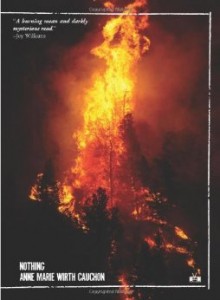Nothing by Anne Marie Wirth Cauchon
 Nothing
Nothing
by Anne Marie Wirth Cauchon
Two Dollar Radio, Nov 2013
178 pages / $16 Buy from Amazon
“The question is how much reality must be retained even in a world become inhuman if humanity is not to be reduced to an empty phrase or a phantom. Or to put it another way, to what extent do we remain obligated to the world even when we have been expelled from it or have withdrawn from it?… Flight from the world in dark times of impotence can always be justified as long as reality is not ignored, but is constantly acknowledged as the thing that must be escaped.” — Hannah Arendt, On Humanity in Dark Times: Thoughts about Lessing
Mrs. Wirth Cauchon’s novel Nothing confronts us with a startling self-portrait, at least for my generation. All who cannot see a part of themselves in this story simply have not been paying attention. Her narrative concerns the exploits of two young women and one young man whose lives intersect in bizarre and serendipitous ways in the modern American West, a place of danger, intrigue, and darkness, but also of an earthy, natural vitality. The setting is deliberately emphasized and plays a vital role in the plot, but it by no means confines the story, for like all good stories, it explores the being of people in the world.
Why so lost? Why such dark times? Our dark times consist not so much in the active persecution and expulsion from the public realm that were the hallmark of Ms. Arendt’s, but instead the “irreality” of politics that attends our own. James, Bridget and Ruth are all expelled from the public realm into merely personal society and suffer tremendously for it. In the absence of anything in particular to do, their personal quests metastasize into monstrous projects all out of proportion to their potential payoff. These are the conditions in which we find them, and the results are fascinating.
Of the three, James has the most tangible quest, to find out the “truth” about his father. As he makes his way to the book’s setting in Missoula, Montana there is an evident relish in the manner in which he chooses to convey and conduct himself that belies his deeper nature. He doesn’t want to find out about his father, he wants to be a guy who wants to find out about his father, one whose very nature is consumed by this oh-so-meaningful project to the degree that he will endure any discomfort to see it accomplished. He wants to embody passion, to demonstrate it to the world in such a way that he will be recognized for it. Why this perversion of a straightforward quest? It tips us to the conditions in which he operates, a sneaking suspicion that the world around him has grown cold and flaccid. His is a demand for hardness in a soft world. To him, his step-father embodies this tendency toward dissolution. He is what society expects him to be and nothing more: quiet, respectable, financially-successful. He lives up to his end of the social contract that offers no great reward, but also no great risk. James wants to be a conqueror, not a sober merchant, in a world that offers little of value to conquer.
Hardness he seeks and hardness he finds. When James locates life’s crueller edges he beats a partial retreat back into the world of softness where he finds Ruth. He will discover that she too has hard edges. Their inability to communicate effectively, to understand one another sympathetically, undoes them both. It seems so odd at points, this inability, but is it not a habit that we have done a good deal to disburden ourselves of? Our world moves at a speed and a level of self-absorption that is conducive neither to quiet contemplation nor thoughtful dialogue. What we cannot digest in thought, we vomit at one another. Ruth and James unravel as quickly as they fell into one another, bound together ultimately by as much nothing as surrounds them.
March 28th, 2014 / 10:00 am
